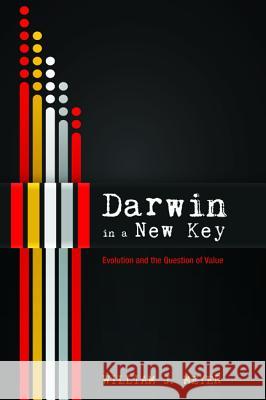Darwin in a New Key » książka
Darwin in a New Key
ISBN-13: 9781498231190 / Angielski / Miękka / 2015 / 136 str.
Darwin in a New Key
ISBN-13: 9781498231190 / Angielski / Miękka / 2015 / 136 str.
(netto: 75,81 VAT: 5%)
Najniższa cena z 30 dni: 78,72
ok. 16-18 dni roboczych.
Darmowa dostawa!
Can one coherently integrate Darwin's view of evolution with an affirmation of the value of existence? In this fresh, lean, and substantive volume, William Meyer addresses this important question. By carefully analyzing Darwin's own writings and by drawing on the philosophical perspectives of William James, Alfred North Whitehead, and others, Meyer persuasively redirects the cultural conversation about Darwin away from the retrospective question of origins toward the prospective question concerning the ultimate significance of evolutionary life. As James recognized, the question about the reality of God is more critical for the forward-looking question of value than it is for the backward-looking question of origins. Darwin was a theist in search of a better theism, and because theology had not yet caught up to him, he became increasingly agnostic and caught between his mechanistic understanding of nature, on the one hand, and his affirmation of the value and beauty of the world, on the other. Whitehead's philosophy of organism offers a way to integrate Darwin's evolutionary insights with his affirmation of the grandeur of nature. Meyer's clearly written and richly argued book enables us to integrate our evolutionary understanding of the world with our experience of value within it. ""William Meyer is one of the sharpest and clearest philosophers writing about evolution and God, and in this focused volume he offers an original interpretation of Darwin that enables us to integrate evolution with an affirmation of the meaning and value of existence. This is an important thesis, carefully argued, that deserves to be read widely."" --Kevin Schilbrack, Chair, Deparment of Philosophy and Religion, Appalachian State University Meyer convinces me that the arguments of Daniel Dennett, Paul Davies, Richard Dawkins and other scientific materialists are flawed as they ignore the authentic voice of Charles Darwin, a voice that speaks not only of survival and reproduction, but also of beauty. From now on, I will view natural selection as having less sharp teeth and claws. --D. Andrew Crain, Professor of Biology, Maryville College ""Giving impressive evidence that evolution on Darwin's account includes the aim at value, this book issues an incisive challenge to any who claim him for an exclusively mechanistic or physicalist account of life's species. Both clear and concise throughout, Meyer also deftly outlines a theistic metaphysics likely unknown to Darwin and in which a teleology of value is consistent with causation by the past."" --Franklin I. Gamwell, Shailer Mathews Distinguished Service Professor Emeritus, the Divinity School, University of Chicago; author of Religion among We the People: Conversations on Democracy and the Divine Good William J. Meyer is Professor of Philosophy and the Ralph W. Beeson Professor of Religion at Maryville College in Maryville, Tennessee. He is the author of Metaphysics and the Future of Theology (2010).
Can one coherently integrate Darwins view of evolution with an affirmation of the value of existence? In this fresh, lean, and substantive volume, William Meyer addresses this important question. By carefully analyzing Darwins own writings and by drawing on the philosophical perspectives of William James, Alfred North Whitehead, and others, Meyer persuasively redirects the cultural conversation about Darwin away from the retrospective question of origins toward the prospective question concerning the ultimate significance of evolutionary life. As James recognized, the question about the reality of God is more critical for the forward-looking question of value than it is for the backward-looking question of origins. Darwin was a theist in search of a better theism, and because theology had not yet caught up to him, he became increasingly agnostic and caught between his mechanistic understanding of nature, on the one hand, and his affirmation of the value and beauty of the world, on the other. Whiteheads philosophy of organism offers a way to integrate Darwins evolutionary insights with his affirmation of the grandeur of nature. Meyers clearly written and richly argued book enables us to integrate our evolutionary understanding of the world with our experience of value within it.""William Meyer is one of the sharpest and clearest philosophers writing about evolution and God, and in this focused volume he offers an original interpretation of Darwin that enables us to integrate evolution with an affirmation of the meaning and value of existence. This is an important thesis, carefully argued, that deserves to be read widely.""--Kevin Schilbrack, Chair, Deparment of Philosophy and Religion, Appalachian State UniversityMeyer convinces me that the arguments of Daniel Dennett, Paul Davies, Richard Dawkins and other scientific materialists are flawed as they ignore the authentic voice of Charles Darwin, a voice that speaks not only of survival and reproduction, but also of beauty. From now on, I will view natural selection as having less sharp teeth and claws.--D. Andrew Crain, Professor of Biology, Maryville College""Giving impressive evidence that evolution on Darwins account includes the aim at value, this book issues an incisive challenge to any who claim him for an exclusively mechanistic or physicalist account of lifes species. Both clear and concise throughout, Meyer also deftly outlines a theistic metaphysics likely unknown to Darwin and in which a teleology of value is consistent with causation by the past."" --Franklin I. Gamwell, Shailer Mathews Distinguished Service Professor Emeritus, the Divinity School, University of Chicago; author of Religion among We the People: Conversations on Democracy and the Divine GoodWilliam J. Meyer is Professor of Philosophy and the Ralph W. Beeson Professor of Religion at Maryville College in Maryville, Tennessee. He is the author of Metaphysics and the Future of Theology (2010).











